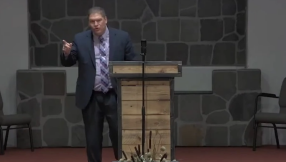An influential evangelical body in the UK is rubbishing the term 'spiritual abuse', warning it could 'enshrine religious discrimination on the statute book'.
The Evangelical Alliance (EA) is highly critical of the definition and claims it could lead people 'potentially to criminalise whole religious communities with whose theology they happen to disagree'.

The EA warns against its use as a category in safeguarding policy, describing it as 'vague and incoherent terminology' that is 'not fit for purpose'.
It comes after a vicar in Oxfordshire was found guilty by the Church of England of spiritually abusing a teenage boy.
Timothy Davis, of Christ Church, Abingdon, was found guilty under the Clergy Discipline Measure (CDM) 2003 of 'conduct unbecoming or inappropriate to the office and work of a clerk in holy orders through the abuse of spiritual power and authority'.
But the report by the Evangelical Alliance's Theology Advisory Group (TAG) urged its member churches to avoid the term.
The 18-page document warns that using 'spiritual abuse' could end up meaning that conservative Christian teaching on homosexuality, marriage and sin would count as abuse.
'It still seems unlikely that it would be the classic Christian theology of marriage and sexuality qua theology that would be criminalised. Rather, it is more likely that the threshold of what might actionable in the existing legal definition of hate speech would be lowered to include even pastorally measured classic Christian preaching on biblical texts,' the report reads.
The document singles out a paper presented to the Royal College of Psychiatrists in April 2017 by Jayne Ozanne as 'of the most concerning examples' of using the term spiritual abuse. The EA claims practices 'deemed potentially actionable by Ozanne include preaching and teaching most mainline churches' positions on same-sex relationships and gay marriage; using "charismatic gifts" referred to in the New Testament; encouraging baptism in the Spirit, and belonging to a "Charismatic Tribe"'.
But Ozanne said the EA's analysis of 'spiritual abuse' was 'at best defensive, and at worst scaremongering'.
She told Christian Today: 'I am deeply perplexed, as I'm sure others will be, as to why the Evangelical Alliance has seen fit to effectively dismiss the concept of spiritual abuse, rather than looking to work constructively with victims to create a safer and more caring church. Their report contains various unfounded claims, which feed the notion that certain parts of the church are under threat from secular society.
'I do not believe my paper has been fairly or accurately characterised and would urge people to read it for themselves.'
The EA's report warns that adopting 'spiritual abuse' into legislation or safeguarding policies could lead to police officers and the Crown Prosecution Service making judgments on whether certain theological teachings amount to abuse.
'In a culture characterised by increasing hostility to classic Christianity, and the growing association of such Christianity with the language of "extremism", the use of "SA" [spiritual abuse] terminology has proliferated in such a way that its further use risks damage to fundamental freedoms of religious thought, expression and assembly,' it says.
It comes after a report by the Churches' Child Protection Advisory Service (CCPAS) found two-thirds of respondents claimed to have suffered from 'spiritual abuse'.
Pointing to characteristics such as 'coercion and control, manipulation and pressuring of individuals, control through the misuse of religious texts and scripture and providing a "divine" rationale for behaviour', 1,002 out of 1,591 respondents to an online survey said they had suffered from 'spiritual abuse'.

But the EA said the sample used was problematic and instead said churches should stick with current definitions of emotional and physical abuse, which it said were sufficient without needing to adopt the term spiritual abuse.
Rev Dr David Hilborn, Chair of TAG, said: 'We are deeply uneasy about increasing usage of the unhelpful and potentially misleading term "Spiritual Abuse". We believe the existing legal frameworks of Emotional and Psychological abuse are sufficient and need to be enforced in religious contexts, as in other contexts.
'However, creating a special category of "Spiritual Abuse" just for religious people potentially singles them out for criminalisation. As such, it carries the risk of religious discrimination, and threatens social cohesion. As a diagnostic term, "Spiritual Abuse" may be well-intended, but this report shows that it is not fit for purpose.'
Steve Clifford, General Director, Evangelical Alliance UK said, 'Churches can and should be healthy communities where people, including those who are vulnerable, are encouraged to flourish. Churches need the support of robust safeguarding language, legislation and training to do this. This report makes a valuable contribution on all of these fronts. It underlines that the Evangelical Alliance is committed to wise, bold scrutiny of policy and practice that ensures the church is able to support people pastorally, and make Jesus known effectively throughout our communities.'













